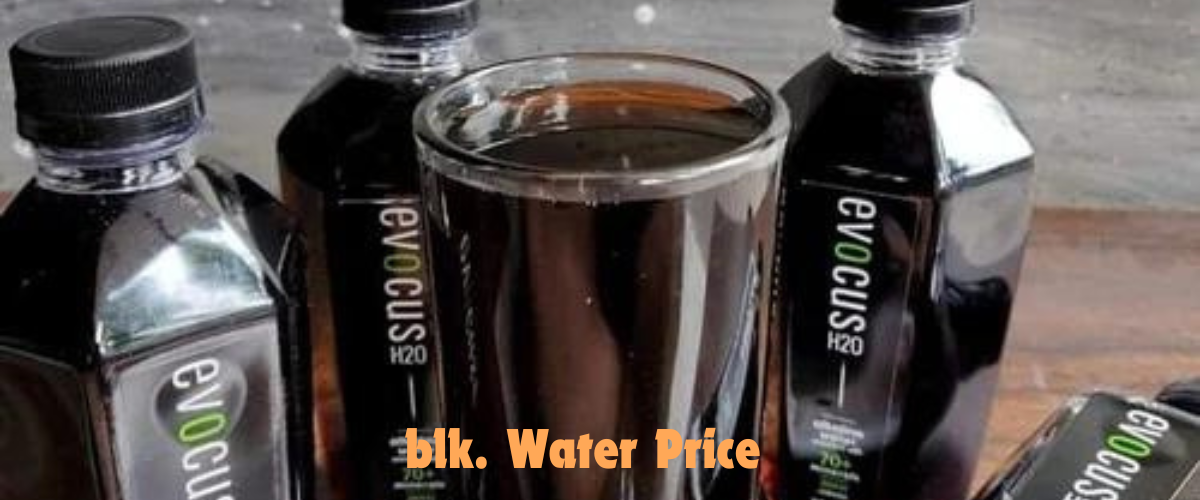When it comes to premium bottled water, blk. water has made a splash with its distinctive black color and bold health claims. Infused with fulvic trace minerals, this alkaline water is marketed as a superior hydration solution. But how does it stack up in terms of cost, value, and benefits? In this comprehensive guide, we’ll explore the blk. Water Price, its unique properties, potential health benefits, and customer feedback, providing a well-rounded view of this intriguing product.
Understanding blk. Water
blk. water stands out not just for its striking appearance but for the fulvic trace minerals it contains. These minerals, derived from decomposed organic matter, are believed to offer a range of health benefits. The water itself is pH-balanced, typically around 8.0, making it alkaline. This higher pH level is thought to help neutralize acid in the body and improve hydration.
The Price of blk. Water
One of the primary concerns for potential consumers is the cost of blk. water. Generally, a 16-ounce bottle costs around $2.99 (01). This price point places blk. water in the premium category, significantly higher than regular bottled water, which can often be found for less than a dollar per bottle.
Factors Influencing the Price
Several factors contribute to the higher price of blk. water:
- Fulvic Trace Minerals: The inclusion of these minerals adds a unique selling point but also increases production costs.
- Marketing and Branding: blk. water’s branding as a premium, health-focused product comes with higher marketing expenses.
- Distribution and Packaging: High-quality packaging and distribution to maintain the integrity of the product also add to the cost.
Comparing blk. Water to Other Sources of Minerals
To understand whether blk. water offers good value, it’s essential to compare it with other mineral sources. Common foods like sardines and spinach provide similar minerals at a fraction of the cost (02). For example:
- Sardines: A can of sardines costs about $1.29 and provides 351mg of calcium and 89mg of magnesium.
- Spinach: A bag of spinach costs around $3.99 and contains 120mg of calcium and 79mg of magnesium.
By comparison, the mineral content in blk. water, although beneficial, comes at a significantly higher price per milligram. This makes it a less cost-effective option for those solely seeking mineral supplementation.
Health Benefits of blk. Water
blk. water is marketed with various health claims, many of which are linked to its fulvic trace minerals. Here are some of the potential benefits:
Hydration
Hydration is the most fundamental benefit of blk. water. Like all bottled waters, it helps maintain the body’s fluid balance, which is crucial for overall health. The unique appearance of blk. water may also encourage people to drink more, which can be particularly beneficial for those who struggle to consume adequate water daily (03) (04).
Mineral Supplementation
Fulvic trace minerals in blk. water include essential nutrients such as magnesium, calcium, and zinc. These minerals are vital for various bodily functions:
- Magnesium: Important for muscle and nerve function, blood sugar control, and bone health.
- Calcium: Crucial for bone health and muscular function.
- Zinc: Supports immune function and wound healing (05).
Antioxidant Properties
Fulvic acid, one of the primary components of the trace minerals in blk. water, has antioxidant properties. Antioxidants help neutralize harmful free radicals in the body, potentially reducing oxidative stress and lowering the risk of chronic diseases (06).
Improved Nutrient Absorption
Some studies suggest that fulvic acid can enhance nutrient absorption by making minerals more bioavailable. This means the body can more easily absorb and utilize these nutrients, potentially improving overall health (07).
Gut Health
Fulvic acid may support gut health by promoting the growth of beneficial gut bacteria. A healthy gut microbiome is associated with improved digestion, immune function, and even mood regulation (08).
Detoxification
There is some evidence that fulvic acid can help detoxify the body by binding to toxins and aiding their elimination. This could be particularly beneficial for removing heavy metals and other harmful substances from the body (09).
Cellular Function
Fulvic minerals can assist in transporting nutrients into cells and waste products out, potentially supporting overall cellular health and function (10).
Energy Production
By enhancing nutrient absorption and cellular function, fulvic minerals might help improve energy levels and overall vitality. This can be particularly beneficial for athletes and those with high physical activity levels (11).
Potential Drawbacks of blk. Water
While blk. water offers several potential benefits, it also has some drawbacks that consumers should consider:
Price
At nearly $3 per bottle, blk. water is significantly more expensive than regular bottled water and other sources of minerals. For those on a budget, the high cost may not justify the potential benefits (12).
Health Claims
Many of the health claims associated with fulvic acid are based on preliminary research. While there is some evidence to support these claims, more extensive human studies are needed to substantiate the benefits fully (13) (14).
Taste and Texture
Some users report an unusual texture or “slimy” mouthfeel due to the minerals, which can be off-putting. Others mention that the taste can change as the minerals settle (15).
Environmental Impact
The environmental impact of bottled water, including blk. water, cannot be overlooked. Bottled water has a higher carbon footprint compared to tap water due to its packaging and transportation. Opting for reusable bottles filled with tap or filtered water is more environmentally friendly (16).
Customer Reviews and Sentiment
Overall, customer reviews for blk. water are mixed but generally positive:
- Positive Reviews: Many customers appreciate the unique taste and the potential health benefits of blk. water. They often note increased hydration and a preference for its flavor compared to regular water.
- Negative Reviews: The most common complaints are related to the high price and the unusual texture. Some users also question the validity of the health claims.
Sustainability Considerations
The environmental impact of bottled water is a significant consideration. Bottled water has a higher carbon footprint compared to tap water due to its packaging and transportation. To minimize environmental impact, consider using a reusable bottle and filling it with tap or filtered water (17).
Conclusion
blk. water offers a unique drinking experience with potential health benefits due to its fulvic trace minerals. However, its high price and the need for more extensive research on its health claims make it a premium choice that may not be necessary for everyone. For those looking for a more cost-effective and environmentally friendly option, adding natural flavors to tap or filtered water might be a better solution.
Ultimately, giving blk. Water Price can be a refreshing addition to your hydration routine, especially if you enjoy its taste and are interested in its potential benefits. Just be mindful of the price and environmental impact when deciding how often to incorporate it into your diet.
FAQs About blk. Water
What is blk. water?
blk. water is a premium bottled water infused with fulvic trace minerals, which give it a distinctive black color. It is pH-balanced and marketed as offering various health benefits.
How much does blk. water cost?
A 16-ounce bottle of blk. Water Price typically remains around $2.99. Prices can vary depending on the retailer and the quantity purchased.
What are the health benefits of blk. water?
Proponents claim blk. water offers several health benefits, including enhanced hydration, improved nutrient absorption, antioxidant properties, better gut health, detoxification support, and improved cellular function.
Are the health claims of blk. water backed by science?
While some studies support the benefits of fulvic acid, many of the health claims associated with blk. water are based on preliminary research. More extensive human studies are needed to substantiate these claims fully.
What does blk. water taste like?
blk. water has a unique taste due to its mineral content. Some users report an unusual texture or “slimy” mouthfeel. Opinions on the taste vary, with some finding it refreshing and others less so.
Is blk. water environmentally friendly?
Like all bottled waters, blk. water has a higher carbon footprint compared to tap water due to its packaging and transportation. Using a reusable bottle filled with tap or filtered water is more environmentally friendly.
How does blk. water compare to other sources of minerals?
blk. water is significantly more expensive than other sources of minerals, such as foods like sardines and spinach. These foods provide similar minerals at a fraction of the cost.
Can blk. water be used daily?
While blk. water can be consumed daily, its high cost might make it impractical for regular use. It can be a refreshing addition to your hydration routine, especially if you enjoy its taste and are interested in its potential benefits.
Are there any side effects of drinking blk. water?
Most people can drink blk. water without any issues. However, some users report an unusual texture or taste. As with any supplement, it’s essential to monitor how your body reacts and consult a healthcare professional if you have any concerns.




